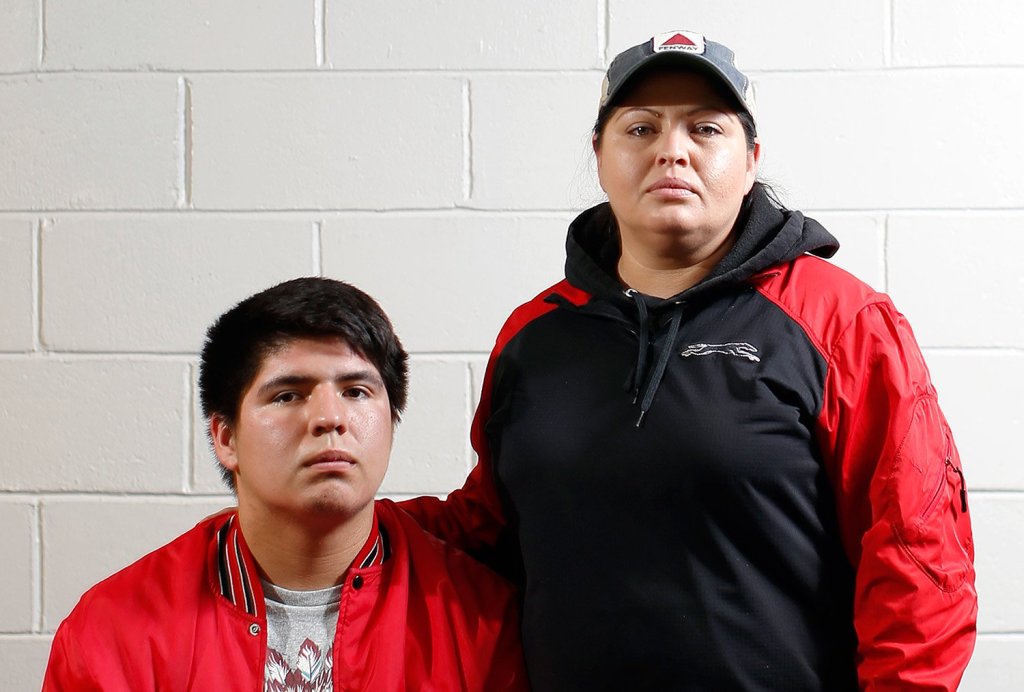On Oct. 13 in Wells, a mother watched her son take the field as a quarterback for his high school football team. She probably felt proud of him, nervous for him, excited and filled with energy in the brisk Maine autumn night. The lights beam over the fans of both teams and there is a mass chaos of snuggly blankets, signs with players’ names, snacks and warm beverages and a cacophony of cheers for the game along with music and thousands of conversations between friends and neighbors from both towns coming out to support the young athletes who represent the future of their communities.
It is a scene many of us are familiar with. As a parent myself, I can relate to watching my children play sports and cheering on their successes while also bracing myself for their setbacks and guiding them through wins and losses so they grow with character and pride in who they are and how they “play” life.
For Lisbon mother Amelia Tuplin, this usually universal experience of parenting came with a dose of something else that Friday night, as she watched the students and fans of Wells High School taunt and degrade people such as her and her son based on their Native American ancestry.
Wells High School has the school mascot “Warriors,” which by itself does not have racial connotations; however, with students’ and fans’ imagery and antics, it is clear that the mascot is meant to represent Native Americans in a stereotypical and harmful fashion. There were drums being beaten, faces painted with fake “war paint,” cheaply fashioned headdresses worn by students and the hand-over-mouth chanting seen in Hollywood depictions of Native people.
This type of behavior is cited in the American Psychological Association’s resolution that calls for the removal of “Indian” mascots because they harm the learning environment and atmosphere for not just Native American students but all students as well. Promoting the stereotypical imagery and likenesses of our people takes away our humanity and treats us like a caricature not worthy of respect and equality. Using sacred symbols like headdresses is blasphemous and sends a message to our children that things they were taught to honor in a religious context are nothing more than trinkets anyone can throw on and make fun of.
It goes deeper than political correctness; it throws symbolic knives at our identity, history, trauma and traditions, and cuts deep at the things we still have that our ancestors struggled and died for. I am a proud Penobscot, and I want my children to know that headdresses are earned and sacred, that drums are for ceremony, that war paint belongs on true warriors and that the roots that they have as indigenous people are strong and not to be degraded by kids at a football game.
Amelia, a citizen of the Micmac Nation, was shocked and outraged by the shameful display of racist behavior and wrote a very eloquent and well-reasoned letter to Wells-Ogunquit Superintendent James P. Daly. After an investigation by school officials and a special session of the Wells-Ogunquit school committee, the superintendent told Amelia that he found nothing wrong with the conduct of the students and fans at the game.
He said that she was misinterpreting their school spirit and pride as racism. He said that although drums were beaten, it was purely for cheering purposes, and the war paint was just school colors. He also said that the “Abenaki tribe of Wells” endorses their mascot and behavior, although he provides no proof of this.
As the ambassador of the Penobscot Nation, I reached out to the the recognized tribal communities of Maine on Amelia’s behalf to make sure there are no tribal officials endorsing this mascot. The reservations in Maine are Penobscot Nation of Indian Island, Passamaquoddy Tribe at Pleasant Point, Passamaquoddy Tribe of Indian Township, Houlton Band of Maliseet and the Aroostook Band of Micmac in Presque Isle. While there is an Abenaki tribe, it is not recognized in Maine and there is no Abenaki tribe of Wells. Furthermore, none of the tribal leaders from any of these places have endorsed this mascot.
The time of accepting institutionalized racism needs to be put behind us. We have been fighting these mascots for so long, and many communities have made the changes and have taken a true step to honor indigenous people. This year, we have seen a wave of communities changing “Columbus Day” to “Indigenous Peoples Day” as a showing of respect and promoting unity between tribal nations and surrounding towns.
In a time in our country when racial tensions are running high, it is important to take steps toward education, communication and understanding our shared humanity. It is hard to accomplish these goals when a Native American high school quarterback has to see his heritage mocked and marginalized under the Friday night lights.
Maulian Dana is Penobscot Nation tribal ambassador and a resident of Indian Island.
Send questions/comments to the editors.



Comments are no longer available on this story